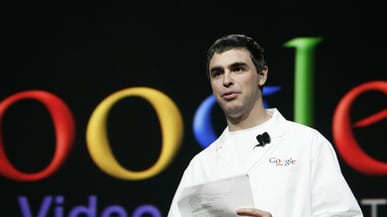I’ve spent the past two weeks pondering Google's “disappointing” first-quarter earnings—the 27 percent increase in revenue and 17 percent jump in income that nevertheless fell short of analysts' predictions, producing a 5.5 percent fall in after-hours trading following the news release. Co-founder and newly re-installed CEO Larry Page took heat for giving all employees a 10 percent raise and hiring 1,900 new employees, then leaving the analysts' call without answering any questions after declaring the quarterly performance to have been “tremendous.”
Here’s my conclusion: Good for Page! He is focusing on the real market—delivering a great service to his customers—rather than on the expectations market—delivering against the latest imaginations of shareholders and analysts about what they think is possible for Google. The former game can be played and won and creates value for society. The latter is a mug's game—no company can beat expectations forever because they have no bounds—and this game has no utility for society.
A stock price is nothing more than the product of the collective expectations of investors as to the future performance of the company in question—in the case of Google (as of close of market Friday, April 15 for all subsequent statistics) that was $530 per share. In order for a new investor to earn a return on that $530 per share investment, especially since Google pays no dividend, expectations of future performance of Google need to rise to a still higher level.
That begs the question: Just how high are those expectations now? A good barometer is the amount investors believe each dollar of real equity on the balance sheet is worth to them in the stock market. The answer is that expectations have set the market value of Google's equity at four times the book value of the equity—a really high multiple. That multiple has powerful implications for how well Google needs to perform in the real market of selling its service to customers in order to satiate the expectations beast.
Neither Google nor any other company has ever or will ever keep generating positive surprises forever. But many die trying.

A financial analyst would calculate Google cost of equity—the level of return it needs to generate for its shareholders to compensate them for the risk they hold—of around 7 percent in the current low-inflation environment. On its real book equity, Google earns a super return of 21 percent, well above the average of large American companies and three times the cost of equity. However, shareholders want a return on what they paid for their stock, not its book value and that means that they need a return of around 28 percent on book equity just to be minimally satisfied. That is why, in the expectations market, a measly 27 percent sales growth and 17 percent profit growth just doesn't cut it.
The only way for Google to satisfy the expectations market is to keep on creating positive surprises for its shareholders because every prior positive surprise is built into today's stock price. Neither Google nor any other company has ever or will ever keep generating positive surprises forever. But many die trying. They keep taking greater risks to meet more unrealistic expectations. The result, both in 2000 and 2008, was a huge and painful meltdown as all the companies trying in their real operations to keep feeding the expectations monster started failing spectacularly, taking real performance and expectations down with them.
Ironically, in the modern capital markets, shareholders put pressure on management to stretch in ways that are profoundly bad for their own shares. That is why Page did them all a big favor in ignoring their silly questions and focusing on keeping happy customers and employees. Shareholders should have applauded him and wished him the best of luck, not the opposite.
Roger Martin is dean of the Rotman School of Management and author of the forthcoming Fixing the Game: Bubbles, Crashes and What Capitalism Can Learn From the NFL.





